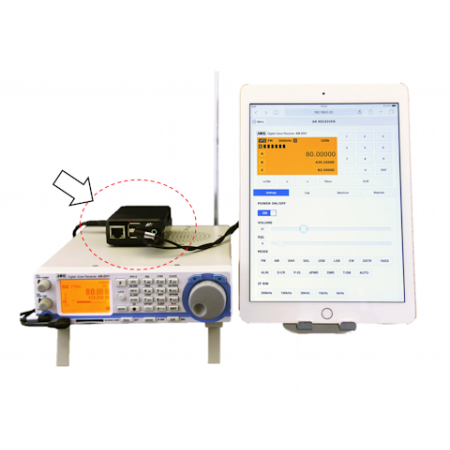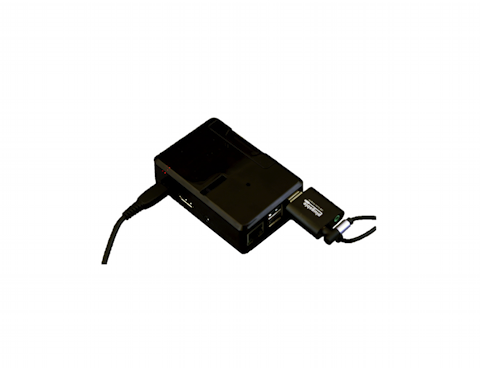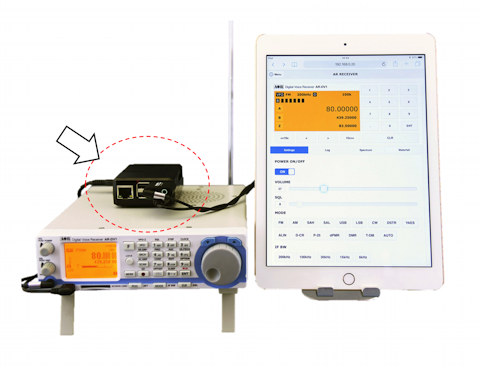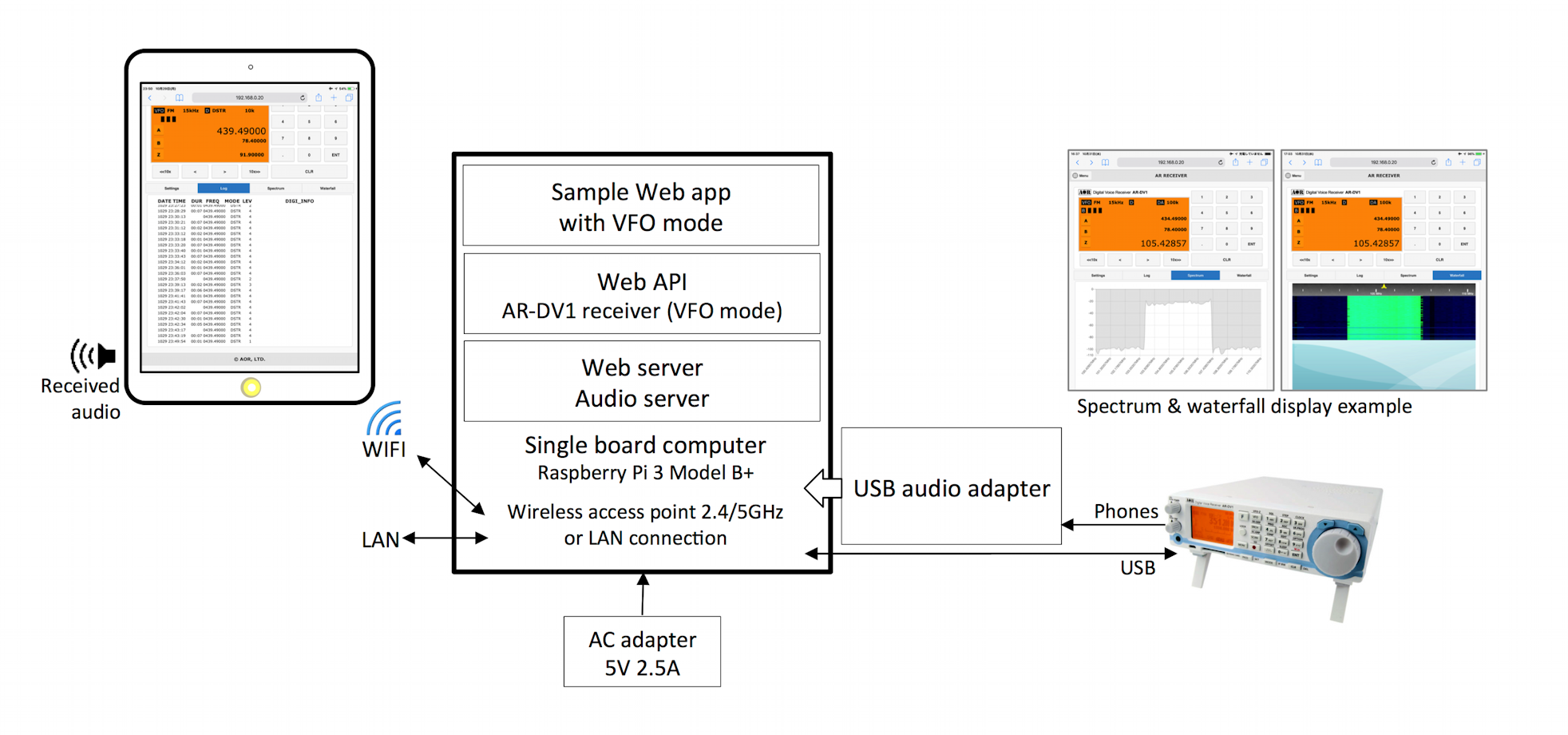- Out-of-Stock




Ref: ARDV1TAI
Out-of-Stock No review at the moment
No review at the moment

AR-DV1 TAI - Tablet app interface for iOS and Android
Small communication device with WIFI enabled Web API
- This product is an API-managed single-board computer device WEB for operating the AR-DV1 receiver in VFO mode.
- They are included: RPI 3B+ with case, AC adapter, SD card containing the operating system special, USB audio adapter, USB cable, user manual, Web API documentation. Source code available on Github.
- Control the AR-DV1 and listen to the audio received, via the tablet's web browser.
- The provided web API allows web app developers to easily create a control app for AR-DV1 even if they are not familiar with the receiver control commands.
- Compatible with AR-DV1 firmware 1903A or later.
- Tested on iPad Safari, Amazon Silk and Android Chrome.
* The operating system can also be purchased as a separate item, pre-installed on a microSD card.
AR-DV1 TAI - Tablet app interface External view AR-DV1 TAI - Interface app for tablets with AR-DV1 receiver
(Receiver, antenna, tablet and tablet AR-DV1 not supplied).
(The adapter case type may change in time.)
AR-DV1 TAI - INFO on the tablet app INFO and TARGET USER AND SKILLS
Users target and skills required:
- Casual AR-DV1 users wanting Conveniently use the receiver in VFO mode and listen to audio from the screen of a tablet via a direct wifi connection. No home network or router required.
The tablet connects directly to the AR-DV1 web adapter
- Advanced AR-DV1 users who want to operate the receiver in mode VFO and listen to audio, via a wifi router and from the Internet. Requires knowledge on how to configure the router (port forwarding, static DHCP).
The tablet yes connects over the Internet to the AR-DV1 Web Adapter
(In the figure above *1: DHCP static / * 2: Global IP address and static IP address or dynamic IP address with dynamic DNS / * 3: port forwarding)
- App developers who want add new features to the provided basic app or create your own control app. For website builders and server developers.
For details, please see the AR Web API technical information page.
※ Specifications are subject to change without notice or obligation.
※ AOR Ltd. will not provide technical support for building web apps.
specifications
1 operating environment
(hardware supplied) Raspberry single board computer Pi 3 Model B+
Audio Input Adapter USB audio adapter for connection to the computer's USB port
Boot media microSDHC 16GB (Class 10 UHS-I A1), installed in the computer's card slot
2 Compatible receiver
(Not supplied) AR-DV1 AOR digital voice receiver, firmware 1903A or later (only one receiver can be controlled per system)
(Not compatible with AR-DV10 portable receiver as some controls are different)
3 Connections with receiver Receiver control USB type A socket (computer side)
Entrance 3.5mmφ audio jack (mono input via USB audio adapter)
4 Connection Network Wireless Access Point 802.11b/g/a - 2.4/5GHz WPA2 (mode only possible) DHCP service
DHCP Client LAN 10/100 / 1000BASE-T (recommended static IP setting via DHCP of the router)
5 Computer power supply AC Adapter DC5V 2.5A, AC100-240V (50/60Hz) with microUSB socket
6 Custody for PC and other sizes Case 62mm (W) x 26mm (H) x 92mm (D)
Once inserted, the USB audio adapter adds another 33 mm to the length of the case.
7 Bootable Media MicroSDHC Card 16GB Class 10 UHS-I A1
Operating system TAI AR-DV1 (integrated software)
Base operating system package: Raspbian Stretch Lite 2018-11-13 Kernel 4.14
8 Node.js web server software configuration, audio server
JavaScript library for the AR-DV1 receiver VFO mode
jQuery, jQuery.mobile, Chart.js, sdr.js, mathbox.js, moment.js and others.
9 Number of 1 simultaneous clients (via Wi-Fi or LAN)
10 Control communication ports TCP 3000 (fixed)
Audio transmission TCP 3000 (fixed)
11 Compatibility browser confirmed
(as of December 2018) - iPad - Safari
- Kindle Fire HD - Amazon Silk *
- Android tablets - Chrome *
(*: The app of built-in example has limited screen size, so it is not recommended.)
◎ WebAPI is available for various browsers that support HTML5 and recent JavaScript for building web apps for different screen sizes.
List APIs
No. Name Description
1 Authenticate Set the authentication parameters
2 Power Turns the receiver on or off
3 ReceiverState Get the state of the receiver
4 Time Sets the receiver's clock
5 Set Frequency the reception frequency
6 DemodulateMode Sets the demodulation mode
7 IF Bandwidth Set or get the IF bandwidth
8 FrequencyStep Set the frequency step
9 FrequencyStepAdjust Sets the value of pitch adjustment
10 DigitalDataOutput Turn information on or off on the digital header and obtains its status
11 LevelSquelch Set o gets the level squelch value
12 Volume Set or get value of the receiver volume
13 VFO Sets or gets VFO parameters
14 DigitalAdditionalInfo Get digital header information
15 SpectrumCenter Set or get the center frequency of the spectrum
-------------------------------------------------- -------------------------------------------------- ---------------------------------------------
AR-DV1 TAI - Tablet App Interface for iOS and Android
Small size communication device with WIFI enabled Web API
- This product is a WEB API operated single board computer device set-up to operate the AR-DV1 receiver in VFO mode.
- Included are: RPI 3B+ with a case, AC adapter, SD card containing the special operating system, USB audio adapter, USB cable, user manual, Web API documentation. Source code available on Github.
- Control the AR-DV1 and listen to the received audio, through your tablet's web browser.
- The supplied web API allows web app developers to easily create a control app for AR-DV1 even if they are not familiar with the receiver's control commands.
- Compatible with AR-DV1 firmware 1903A or later.
- Tested on iPad Safari, Amazon Silk and Android Chrome.
* The operating system can also be purchased as a separate item, preinstalled on a microSD card.


(Not supplied AR-DV1 receiver, antenna, tablet and tablet stand.)
(Adapter case type may change over time.)

Target users and required skills:
- Casual AR-DV1 users who wish to conveniently operate the receiver in VFO mode and listen to the audio, from a tablet screen via a direct wifi connection. No home network or router required. 
- Advanced AR-DV1 users who wish to operate the receiver in VFO mode and listen to the audio, via a wifi router, and from the Internet. Requires knowledge on how to set up your router (port forwarding, static DHCP). 
( In the figure above *1: static DHCP / *2: global IP address, and static IP address or dynamic IP address with dynamic DNS / *3: port forwarding )
- App developers who wish to add new functions to the supplied basic app, or create their own control app. For web creators and server developers.
Please refer to the AR Web API technical information page for details.
※Specifications are subject to change without notice or obligations.
※ AOR Ltd. will provide no technical support for the creation of web apps.
Specifications
1
Operating environment
(supplied hardware)
Single board computer
Raspberry Pi 3 Model B+
Audio input adapter
USB audio adapter to connect to the computer's USB port
Boot media
microSDHC 16GB (Class 10 UHS-I A1), installed in the computer's card slot
2
Compatible receiver
(not supplied)
AOR's AR-DV1 Digital Voice Receiver, firmware 1903A or later (Only one receiver can be controlled per system)
(Not compatible with the AR-DV10 hand-held receiver as some commands are different)
3
Connections with receiver
Receiver control
USB Type-A socket (computer side)
Audio input
3.5mmφ jack (mono input via USB audio adapter)
4
Network connection
Wireless access points
802.11b/g/a - 2.4/5GHz WPA2 (only possible mode) DHCP service
LAN
10/100/1000BASE-T DHCP client (Static IP setup via router's DHCP is recommended)
5
Computer power supply
AC adapter
DC5V 2.5A, AC100-240V(50/60Hz) with microUSB plug
6
PC case & other dimensions
Case 62mm(W) x 26mm(H) x 92mm(D)
When inserted, the USB audio adapter adds another 33mm to the case's length.
7
Boot media
MicroSDHC card 16GB Class 10 UHS-I A1
AR-DV1 TAI OS (built-in software)
Base operating system package: Raspbian Stretch Lite 2018-11-13 Kernel 4.14
8
Software configuration
Node.js web server, audio server
JavaScript library for AR-DV1 receiver VFO mode
jQuery, jQuery.mobile, Chart.js, sdr.js, mathbox.js, moment.js, and others.
9
Number of concurrent clients
1 (either via wifi or LAN)
10
Communication ports
Control
TCP 3000 (fixed)
Audio transmission
TCP 3000 (fixed)
11
Confirmed browser compatibility
(as of Dec.2018)
- iPad -- Safari
- Kindle Fire HD -- Amazon Silk*
- Android Tablet -- Chrome*
( *: The built-in sample app has limited screen size, therefore not recommended.)
◎ WebAPI is available for various browsers that support HTML5 and recent JavaScript for creating Web apps for different screen sizes.
API list
No.
Name
Description
1
Authenticate
Set authentication parameters
2
Power
Turn the receiver on or off
3
ReceiverState
Get the status of the receiver
4
Time
Set the receiver clock
5
Frequency
Set the receive frequency
6
DemodulateMode
Set the demodulation mode
7
IFbandwidth
Set or get the IF bandwidth
8
FrequencyStep
Set the frequency step
9
FrequencyStepAdjust
Set the step adjust value
10
DigitalDataOutput
Toggle the digital header information on or off and get its state
11
LevelSquelch
Set or get the level squelch value
12
Volume
Set or get the receiver volume value
13
VFO
Set or get the VFO parameters
14
DigitalAdditionalInfo
Get the digital header information
15
SpectrumCenter
Set or get the spectrum's center frequency
16
SpectrumSpan
Set or get the spectrum's span value
17
SpectrumData
Get the spectrum graph data
18
Smeter
Get the S-Meter values
19
ReceiverStateNotification
Set the receiver state notifications interval
20
Adapter
Operate the "AR-DV1 TAI Web Adapter" hardware
21
CTCSS
Set or get information from the tone squelch
22
DCS
Set or get information from the DCS squelch
23
DCREncryptionCode
Set or get the DCR/NXDN 15bit digital scrambling code value
24
TTCSlot
Set or get the slot number of the T-TC mode reception
WebSocketAPI
No.
Name
Description
w-1
Sound
API to get sound from the receiver
w-2
ReceiverState
API that gets periodic notifications from the receiver
w-3
DigitalAdditionalInfo
API to receive notifications when the receiver receives digital collateral information